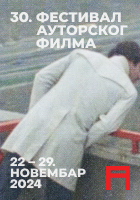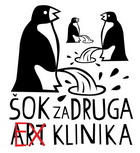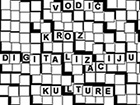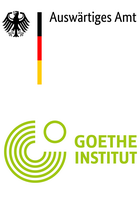Solidarity of Region Festivals with Ukraine
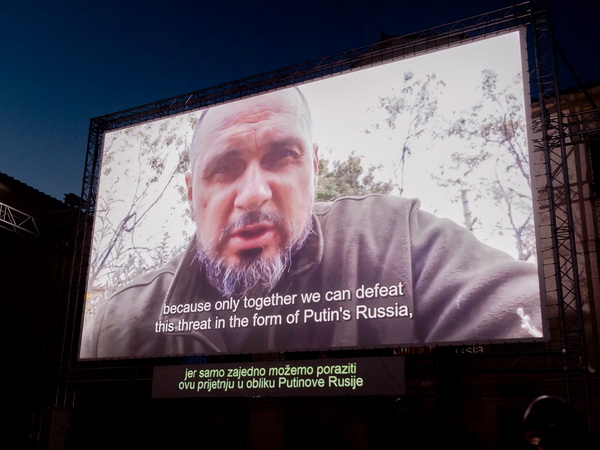
The beginning of the Russian invasion of Ukraine, after a two-year pandemic crisis that shook the otherwise fragile cultural scene in the region, experienced practically unanimous condemnation, and numerous festivals, events and actors in the field of culture at least with programs tried to draw attention to their Ukrainian counterparts. Some offered residential accommodation to endangered artists from Ukraine, but also to those who were forced to leave Russia in order to avoid arrest or mobilization. There are also examples of personal delivery of aid to Ukraine, such as Crocodile's action for premature babies in Kharkiv.
The first major international event in the region after the outbreak of the war in Ukraine was the jubilee, 50th Fest in Belgrade, opening of which on February 25 took place in a rather gloomy atmosphere, although there were great reasons to celebrate half a century of history. The Artistic Director and Selector of the 50th Fest Jugoslav Pantelić reminded that the Fest was created and experienced the greatest success during the Cold War, but also had many challenges, wars in the environment, and abstained for two years during the international sanctions of the 90s. However, he believes that the founders of the Fest and everyone else who ran it could not even think that the 50th edition of the festival would be opened at a time when a real war was happening in the immediate vicinity.
"We hope that peace and common sense will prevail and that you will enjoy the films of the 50th Fest in the way you have done so far and as you will do for at least another 50 years until its hundredth edition", said Pantelić at the opening of the 50th Fest.
The stars of the ceremonial opening of the Jubilee Fest were Director Emir Kusturica and Actor Predrag Miki Manojlović, winners of the "Belgrade Winner" honorary award, who declared the 50th Fest open. Although he is considered a great friend of Russia, Kusturica did not refer back to the Russian-Ukrainian conflict, which started the day before.
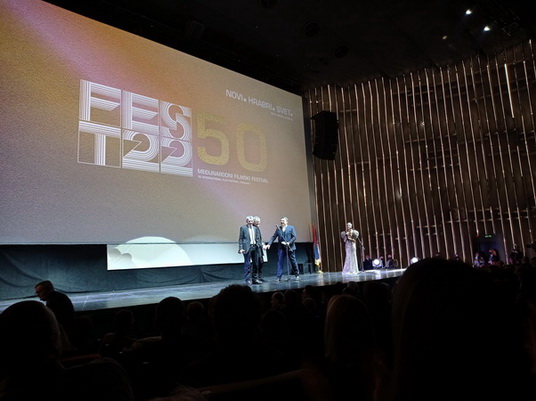
50th Fest - opening, photo: SEEcult
One of the first stars of the world art scene who spoke out against the Russian invasion of Ukraine and called for solidarity was the performance star Marina Abramović, originally from this area. The day after the start of the war, she called for an immediate cessation of hostilities.
Stating that she was born in Yugoslavia - a country where cultures from the West and Russia from the East intersected, Marina Abramović stated that in recent years she had worked in Ukraine and had met the people there, who were proud, strong and dignified. "I express full solidarity with them. An attack on Ukraine is an attack on all of us, on humanity. It has to stop!", said Marina Abramović in a short video on social networks.
Not long after the 50th Fest, strong solidarity with Ukraine was already expressed on March 3rd at the announcement conference of the 19th Belgrade Dance Festival, traditionally held in the building of the Serbian Parliament, in the presence of state and city officials, as well as ambassadors of the countries from which the artists come.
They congratulated BFI Director Aya Jung on her success in overcoming all the obstacles caused by the pandemic, and used the opportunity to emphasize the importance of solidarity with Ukraine.
Solidarity with Ukraine was expressed by the officials of the Embassies of Germany, France, Belgium, Italy, Israel, the Netherlands, Argentina and Canada.
The German Ambassador in Belgrade, Thomas Schieb, stated that today there is another crisis and emphasized the importance of solidarity with the Ukrainian people, which, in his opinion, was demonstrated in the best way on March 2 during the vote of the UN General Assembly. "Yesterday, great solidarity was shown when 141 countries adopted the Resolution against aggression", Schieb pointed out, who was joined in a similar tone by the other ambassadors, especially mentioning that Serbia also voted for the resolution.
Only the ambassador of Cuba, which was one of the 35 abstaining countries in the UN, did not refer to the Russian-Ukrainian war.
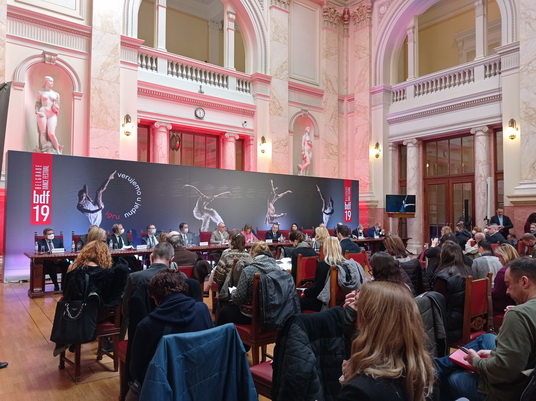
19th Belgrade Dance Festival, press conference, photo: SEEcult
Ukraine was the focus of the 29th Palić European Film Festival (FEF), which showed the following films in mid-July: "Reflection" by Director Valentin Vasjanovich, "Bad Roads" by Natalya Vorozhbit, "Rhino" by Oleh Sentsov, "Stop Zemlia" by Katarina Goronstai, "Roses" by Irena Chechenko and "This rain will never stop" by Alina Gorlova. The program was implemented in cooperation with the Ukrainian Institute, a public institution under the Ministry of Foreign Affairs of Ukraine, which facilitates international connections of people and institutions and creates opportunities for Ukraine to communicate and cooperate with the world.
The Program Director of the 29th FEF Palić, Miroslav Mogorović, emphasized on that occasion that Ukrainian filmmakers in the last decade have developed an authentic and bold cinematic expression, stylistically relying on surrealism.
"This creative inspiration of new young and promising authors has once again returned Ukrainian cinematography to the spotlight of world festivals, and before the beginning of the aggression we are witnessing, Ukrainian film experienced a new great upsurge. In our selection of contemporary Ukrainian films, female authors stand out, whose female perspective brings something new and authentic, whether it is looking at military conflicts or following an intimate drama about growing up and falling in love," said Mogorović.
The winner of the honorary award of the 29th Palić "ALeksandar Lifka", the famous Serbian writer, screenwriter and Director Dušan Kovačević, also reflected on the new crisis in Europe. He assessed that today's world is not on a good path and that the most catastrophic thing is that there is easy talk about a possible nuclear war.
"We can talk for hours about what will happen, make predictions, but it won't be good." And that is clear to anyone who even thinks with some sense of the horror called war," Kovačević told reporters in Palić on July 16..
"This story with the war in Ukraine is a catastrophic story. And the most catastrophic fact is that a possible nuclear war is being talked about like a drunk best man firing a gun at a wedding. And the very fact that 20 people decide the fate of eight billion people. And that it is not particularly tragic for anyone that this civilization will be destroyed", said Kovačević, who is also a member of the Serbian Academy of Sciences and Arts.
The Belgrade International Theater Festival (Bitef), which is in its 56th edition held at the end of September, began in the spirit of anti-war messages, and was opened by the Russian Theater Critic, Director and Curator Marina Davydova - with a call for peace in Ukraine and a sharp criticism of the Russian authorities, whom she accused of destroying Russian culture.
"When you intend to support the war that Russia is waging because you love Russian culture, think about the fact that culture is the biggest victim of this war," said Marina Davydova, who was recently forced to leave Russia due to her political views, and who has been attending Bitef since half nineties. Pointing out that she considers Bitef to be one of the most important festivals in Europe, and that she has always felt a special love for Russia and Russian culture at it, Marina Davydova said that probably because of the centuries-old sympathy between the two countries, she often encountered attempts to justify the foreign policy of her homeland in Serbia.
"Tonight I would like to ask you to try to hear the voice of millions of Russians who do not support the current war and to understand why true love for Russia is incompatible with supporting the attack on Ukraine. Since none of us in this audience belongs to the world of politics but to the world of culture, I suggest that we leave aside the geopolitical aspect of this problem (a lot of demagoguery could accumulate around it), and that we look at the current war in Europe through the prism of fine arts. It is important to understand that on February 24, Russia did not only attack Ukraine, but declared war on its own culture as well," said Marina Davydova.
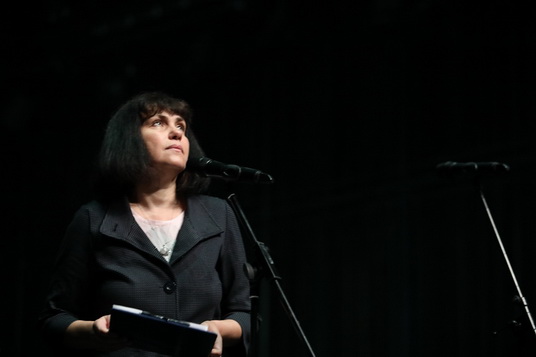
Artistic Director of Bitef, Ivan Medenica, reminded that Marina Davydova was a great friend of Bitef, which she had followed several times, wrote about it, was a member of the jury, and at the 53rd Bitef, she participated with the installation "Eternal Russia" produced by Theater HAU from Berlin. Due to the current situation, Davydova "was forced to leave Moscow when the letter Z appeared on her apartment door". Bitef therefore, by inviting Marina Davydova to open the 56th edition of the festival, wanted to honor all victims of the Russian invasion.
"We want to emphasize that the victims of the Russian invasion of Ukraine are not only the citizens of Ukraine, who are undoubtedly the biggest victims, but also independent Russian artists and intellectuals. We are proud that none of the Russian artists who have been guests at Bitef in the last quarter of a century - Marina Davydova, Kirill Serebrenikov, Yuriy Pogrebnicho, Andrey Moguchy, Dmitri Chernyakov - did not support aggression. On the contrary. And that's why they suffer the consequences," said Medenica at the press conference of the 56th Bitef, which from September 23 to October 2 presented nine provocative productions from Germany, Belgium, Mexico, France, Serbia, Slovenia and Great Britain, united by the slogan "We - The Heroes Of Our Own Labour".
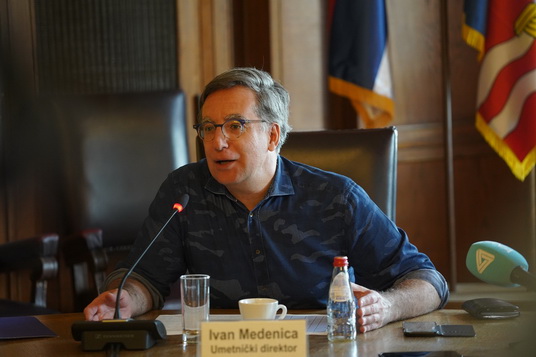
Ivan Medenica, photo: Jakov Simović
Many other festivals in the region also dedicated a part of their program to Ukraine.
The Motovun Film Festival in Istria, held at the end of July, showed for the first time in its program a film by a director who is on the battlefield, and it was "Rhino" by Oleg Sentsov, who is fighting on the side of the Ukrainian army.
Sentsov was arrested at the time of Russia's annexation of Crimea in 2014 and sentenced to 20 years in prison. From prison, he co-directed the feature film "Numbers", and the European Parliament awarded him the "Sakharov" prize for freedom of opinion. He was released in 2019 as part of a prisoner exchange between Russia and Ukraine. "Rhino" premiered in 2021 in competition "Horizons" at the Venice Film Festival.
The jubilee, 20th Human Rights Film Festival (HRFF) in Zagreb, which will be held at the beginning of December, is focused on the war in Ukraine.
Organized by the Multimedia Institute/MaMa and Močvare, the most important part of the film and speech program of the 20th HRFF dealt precisely with the conflict in Ukraine and its immediate consequences. Among other things, four films by director Mantas Kvedaravicius from Lithuania, who died in Mariupol in April, will be shown: the documentary Mariupolis, Mariupolis 2 and Barzakh, and the feature film Parthenon.
Also, the permanent festival program "Sakharov Academy" is entirely devoted to Ukraine.
Artists from the region also used the international attention to condemn the war in Ukraine, so Sarajevo-based director Jasmila Žbanić, whose award-winning war drama "Quo Vadis, Aida?" about Srebrenica won the Lux film award of the European Parliament, called at the award ceremony in Strasbourg to end the war in Ukraine.
"I am shocked that we, the Europeans, allowed the war in Ukraine. We have not found a way to negotiate to prevent it from happening. Please find a way to stop the war in Ukraine... Take care of countries that are not in the European Union and save our region, because it could be next", said Jasmila Žbanić on June 8 in front of European parliamentarians. She received the Lux award in the company of the president of the Mothers of Srebrenica organization, Munira Subašić, who also called for an end to the war in Ukraine.
"It's been 27 years since the genocide in Srebrenica, which I survived, but 22 members of my family perished," said Munira Subašić and added that she prays to God that no mother will suffer a similar experience again. However, as she emphasized, mothers in Ukraine are crying for the bones of their sons. "And Russian mothers too, because their sons go to war either to become murderers or to be killed. Stop the war!", said Munira Subašić.
*Photo 1: Oleg Sentsov, Motovun film festival (Samir Cerić Kovačević)
(SEEcult.org)
*Funded by the Stabilisation Fund for Culture and Education 2022 of the German Federal Foreign Office and the Goethe Institut




